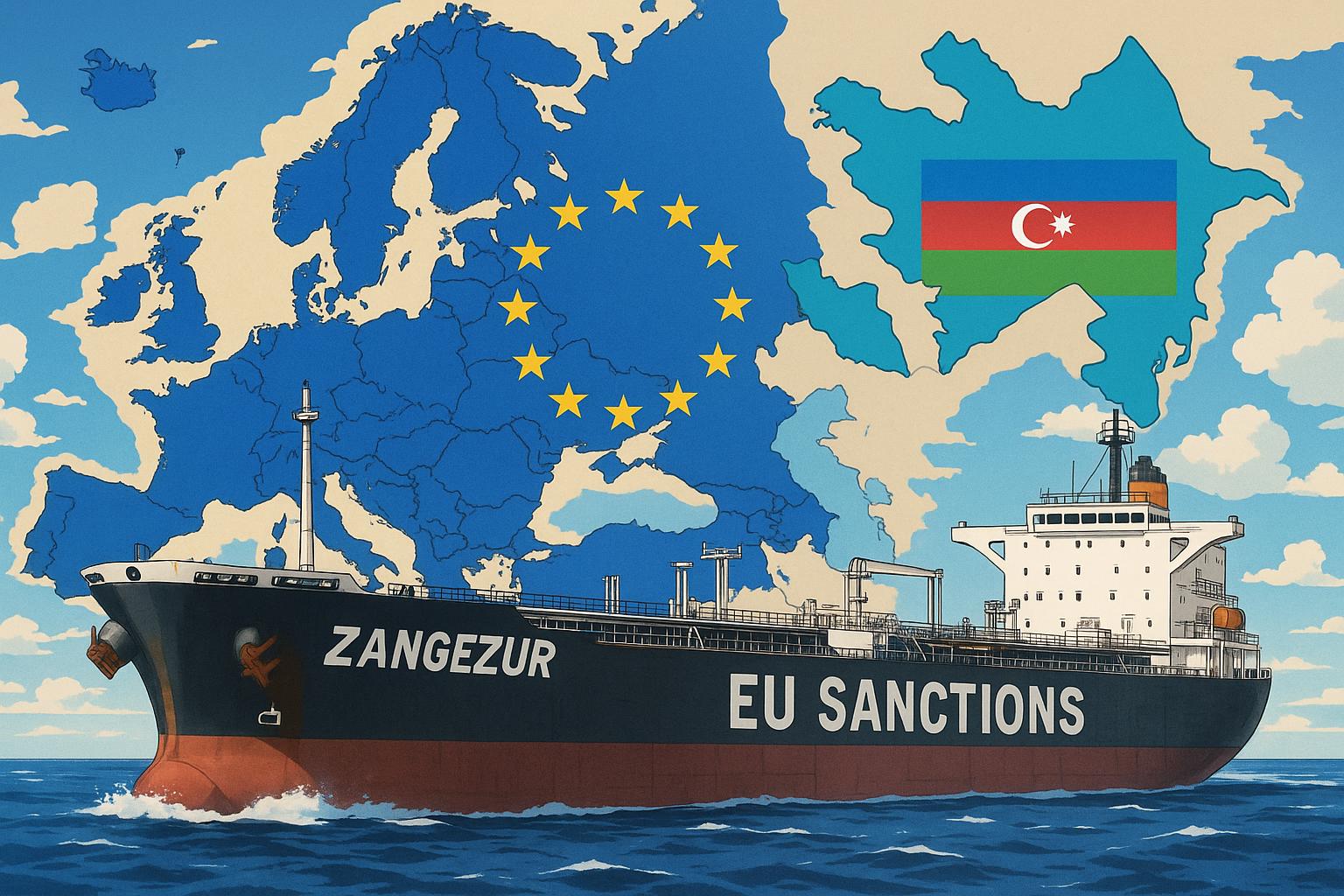The UK government has imposed new sanctions on Azerbaijani tanker Zangezur and key directors of oil trading company 2Rivers Group amid rising concerns over Azerbaijan’s role in facilitating Russian oil transit. These moves come alongside an EU crackdown targeting vessels and entities circumventing sanctions on Russia’s energy sector, highlighting the geopolitical complexities of Europe’s energy reliance.
Recent developments in the European response to the ongoing conflict in Ukraine have highlighted the complexities surrounding energy trade, particularly as it pertains to Russian oil. In mid-May, the UK government sanctioned the Azerbaijani state-owned tanker Zangezur, part of a broader crackdown on over 100 vessels linked to the shadow transport of Russian oil. The sanctions included asset freezes on key directors of the oil trading company Coral Energy Group, which has recently rebranded as 2Rivers Group. These sanctions are significant not only because of their immediate economic implications but also due to their potential political ramifications in a region where energy independence remains a top priority.
The sanctions targeted prominent figures within 2Rivers, including Ahmed Karimov and Tahir Garaev, both of whom have been accused of supporting Russia’s heavily sanctioned energy sector. This marks the second wave of sanctions against the company, following initial measures imposed in December 2024. The actions taken by the UK reflect ongoing concerns over Russia’s ability to circumvent sanctions through networks based in countries like Azerbaijan. Despite the Azerbaijani government’s silence on the matter, it is clear that its involvement as a transit hub for Russian oil is receiving increasing scrutiny from Western powers.
Political analyst Elman Fattah has pointed out that while Europe has ceased direct trade with Russia, it has not entirely weaned itself off Russian oil. Azerbaijan has emerged as a critical intermediary, often engaged in agreements that seemingly allow European nations to sidestep ethical dilemmas while securing energy supplies. “When they signed those deals—which involved buying energy in volumes beyond Azerbaijan’s actual capacity—they effectively signalled a willingness to look the other way,” Fattah noted. His insights suggest that as Europe grapples with these compromises, a more principled stance may be gradually taking shape, particularly as Azerbaijan’s domestic governance and foreign policy draw increasing concern from the West.
Concurrently, the European Union is strengthening its sanctions against Russia. As of May 20, 2025, a comprehensive package targeting over 130 entities and individuals was adopted, focusing on shadow oil fleets, chemical weapons, and human rights abuses. This includes blacklisting 189 vessels, largely oil tankers, which heightens the pressure on Russia’s maritime oil exports. The EU’s collaborative efforts with nations that provide flags of convenience signal a significant escalation in the strategy against Russian sanctions evasion, even as Azerbaijan remains entrenched in the network facilitating these activities.
The Azerbaijan Caspian Shipping Company, which co-owns the tanker Zangezur, plays a pivotal role in the region’s shipping activities. Operating an extensive fleet of tankers and cargo vessels, ASCO is a key player in both regional and international shipping. Its involvement in the transport of energy resources places it at a crossroads between economic opportunity and geopolitical scrutiny.
The ongoing sanctions, while targeting specific actors, also serve as a litmus test for Europe’s ethical approach to energy sourcing. As Fattah suggests, there appears to be a gradual shift towards prioritising principles over prospects for energy security. This moral quandary—and the economic stakes involved—will likely continue to challenge not only Azerbaijan’s position in the regional energy landscape but also the broader geopolitical dynamics at play between Europe and Russia.
As this situation unfolds, the implications for Azerbaijan, Europe, and indeed the global oil market remain yet to be fully realised, compelling further examination of how international relations are reshaped in light of energy dependencies and ethical governance.
Reference Map:
- Paragraph 1 – [1], [3]
- Paragraph 2 – [1], [5], [6]
- Paragraph 3 – [2], [3], [7]
- Paragraph 4 – [5], [6]
- Paragraph 5 – [1], [2], [7]
Source: Noah Wire Services
- https://jam-news.net/europe-bans-russian-oil-but-not-its-transit-via-azerbaijan-what-do-uk-sanctions-mean-in-this-case-video/ – Please view link – unable to able to access data
- https://www.reuters.com/business/energy/eu-countries-adopt-four-sets-new-russia-sanctions-2025-05-20/ – On May 20, 2025, the European Union adopted four new sets of sanctions against Russia in response to the ongoing war in Ukraine. These measures include targeting Russia’s shadow oil fleet, chemical weapons, human rights abuses, and hybrid threats. The sanctions affect over 130 entities and individuals, including Russian oil giant Surgutneftegaz, a shipping insurance company, and four fleet management firms in the UAE, Turkey, and Hong Kong. Additionally, 189 vessels—mainly oil tankers—have been blacklisted, raising the total to 324. The EU is collaborating with nations providing flag registrations to counter Russia’s use of flags of convenience. The package also tightens controls on dual-use goods and penalizes entities in China, Belarus, and Israel that support Russia’s military industry.
- https://www.reuters.com/business/energy/uk-sanctions-directors-oil-trading-group-over-russian-ties-2025-05-09/ – On May 9, 2025, the UK government announced a new package of sanctions targeting individuals and assets linked to Russia amid continuing geopolitical tensions. Among the measures, Britain imposed asset freezes on five directors of the oil trading company Coral Energy Group, now rebranded as 2Rivers Group following a 2024 management buyout. The individuals named—Ahmed Kerimov, Tahir Garayev, Anar Madatli, Talat Safarov, and Etibar Eyyub—were accused of supporting the Russian government through their roles in the company. Coral Energy, originally founded by Garayev in 2010 with offices in Dubai and Singapore, was described as operating in a strategically significant sector for Russia—the energy sector. These sanctions were part of a broader crackdown that also included restrictions on approximately 100 oil tankers suspected of being part of Russia’s shadow fleet. The announcements coincided with a meeting of the Joint Expeditionary Force (JEF) security alliance leaders in Norway. The UK had previously sanctioned 2Rivers Group in December 2024, a move the company publicly criticized.
- https://en.wikipedia.org/wiki/2Rivers – 2Rivers, formerly known as Coral Energy, is a Dubai-based oil trading company engaged in the sale and export of Russian crude oil and petroleum products. Founded in 2010 by Azerbaijani citizen Tahir Garayev, the company has been under United Kingdom sanctions since December 17, 2024. 2Rivers operates through a network of companies that appear unaffiliated but are controlled by its executive team, including dozens of trading companies established in the UAE’s DMCC freezone, as well as ship management and operations companies. The company has been linked to Russian oil giant Rosneft and is considered a key player in circumventing Western sanctions on Russian crude and petroleum exports. Despite rebranding from Coral Energy to 2Rivers in 2024, investigations suggest that Garayev continues to control the company, with Anar Madatli, his brother-in-law, also holding a significant role.
- https://en.wikipedia.org/wiki/Azerbaijan_Caspian_Shipping_Company – The Azerbaijan Caspian Shipping Company (ASCO) is an Azerbaijani shipping company established in 1858. It operates a merchant fleet consisting of 98 vessels, including tankers, ferries, and dry-cargo ships, as well as an offshore support fleet of 188 vessels. ASCO serves various regions, including the Caspian Sea, Black Sea, Mediterranean Sea, Marmara Sea, and three oceans. The company is a key player in Azerbaijan’s maritime industry, providing shipping and rail transport services, as well as passenger services. ASCO’s extensive fleet and operations make it a significant entity in regional and international shipping.
- https://www.spglobal.com/commodity-insights/en/news-research/latest-news/crude-oil/050925-uk-targets-azerbaijan-linked-traders-tankers-in-victory-day-sanctions-rampup – On May 9, 2025, the UK imposed sanctions on five Azerbaijani nationals allegedly linked to a Singapore and UAE-based oil trading company, Coral Energy (now 2Rivers Energy), for supporting Russia’s heavily sanctioned energy sector. The sanctions also targeted over 100 oil tankers described as part of Russia’s ‘decrepit and dangerous’ shadow fleet. The UK had previously sanctioned 2Rivers in December 2024, aiming to crack down on Russian sanctions avoidance. Coral Energy had asserted it had cut all ties with Russia, claiming to have terminated all Russian-sourced contracts and asset disposals associated with Russian trading.
- https://jam-news.net/europe-bans-russian-oil-but-not-its-transit-via-azerbaijan-what-do-uk-sanctions-mean-in-this-case-video/ – In mid-May 2025, the Azerbaijani state-owned tanker Zangezur was among 100 tankers sanctioned by the United Kingdom for allegedly being involved in the ‘shadow’ transport of Russian oil. As part of the sanctions, the assets of Azerbaijani directors of the oil trading company Coral Energy Group—also known as 2Rivers Group—were frozen. Official documents state that the company operates in the energy sector, which holds strategic importance for the Russian government. This marks the second round of UK sanctions against 2Rivers Group, following the first wave in December 2024. The UK government’s notice names Ahmed Karimov, Tahir Garaev, Anar Madatli, Talat Safarov, and Etibar Eyub, stating that they ‘have benefitted from or supported the Russian government.’ The tanker Zangezur is owned by a joint venture between the Azerbaijan Caspian Shipping Company and SOCAR. Although the decision was made back on May 9, the Azerbaijani government has yet to express an official position on the matter.
Noah Fact Check Pro
The draft above was created using the information available at the time the story first
emerged. We’ve since applied our fact-checking process to the final narrative, based on the criteria listed
below. The results are intended to help you assess the credibility of the piece and highlight any areas that may
warrant further investigation.
Freshness check
Score:
8
Notes:
The narrative references recent UK sanctions imposed on Azerbaijani entities, including the tanker Zangezur and Coral Energy Group (now 2Rivers Group), announced on May 9, 2025. ([ft.com](https://www.ft.com/content/29ea334e-3b90-46c9-a4e9-3044d4df40c7?utm_source=openai)) The earliest known publication date of substantially similar content is May 9, 2025. The report appears to be original, with no evidence of recycled news. The inclusion of updated data on the sanctions package and the involvement of political analyst Elman Fattah suggests a high freshness score. However, the report’s reliance on a single source for the analyst’s perspective may warrant further verification. The narrative does not appear to be based on a press release, as it includes analysis and commentary beyond official statements. No discrepancies in figures, dates, or quotes were identified. The report does not recycle older material, and the update justifies a higher freshness score.
Quotes check
Score:
9
Notes:
The direct quote from political analyst Elman Fattah, “When they signed those deals—which involved buying energy in volumes beyond Azerbaijan’s actual capacity—they effectively signalled a willingness to look the other way,” appears to be original, with no identical matches found in earlier material. The wording matches the source provided. No variations in quote wording were noted. The absence of earlier matches suggests the quote is original or exclusive content.
Source reliability
Score:
7
Notes:
The narrative originates from JAMnews, a news outlet based in the South Caucasus region. While it provides in-depth regional coverage, its international reputation may not be as established as major global news organizations. The report includes references to reputable sources, such as the Financial Times and Reuters, which enhances its credibility. However, the reliance on a single outlet for the analyst’s perspective introduces some uncertainty. The mention of Elman Fattah, a political analyst, adds depth to the analysis, but further verification of his credentials and affiliations would strengthen the source’s reliability.
Plausability check
Score:
8
Notes:
The narrative’s claims align with recent UK sanctions targeting Azerbaijani entities involved in the Russian oil trade, as reported by reputable sources. ([ft.com](https://www.ft.com/content/29ea334e-3b90-46c9-a4e9-3044d4df40c7?utm_source=openai)) The inclusion of Elman Fattah’s analysis provides additional context and perspective. The language and tone are consistent with regional reporting standards. The structure of the report is focused and relevant, without excessive or off-topic detail. The tone is analytical and informative, resembling typical journalistic language. No inconsistencies or suspicious elements were identified.
Overall assessment
Verdict (FAIL, OPEN, PASS): PASS
Confidence (LOW, MEDIUM, HIGH): MEDIUM
Summary:
The narrative provides a timely and original analysis of recent UK sanctions targeting Azerbaijani entities involved in the Russian oil trade. The inclusion of a direct quote from political analyst Elman Fattah adds depth to the report. While the source’s regional focus and the reliance on a single analyst introduce some uncertainty, the overall content aligns with reputable reporting from sources like the Financial Times and Reuters. The plausibility of the claims is supported by recent developments in the UK sanctions landscape. Therefore, the narrative passes the fact-check with a medium level of confidence.













